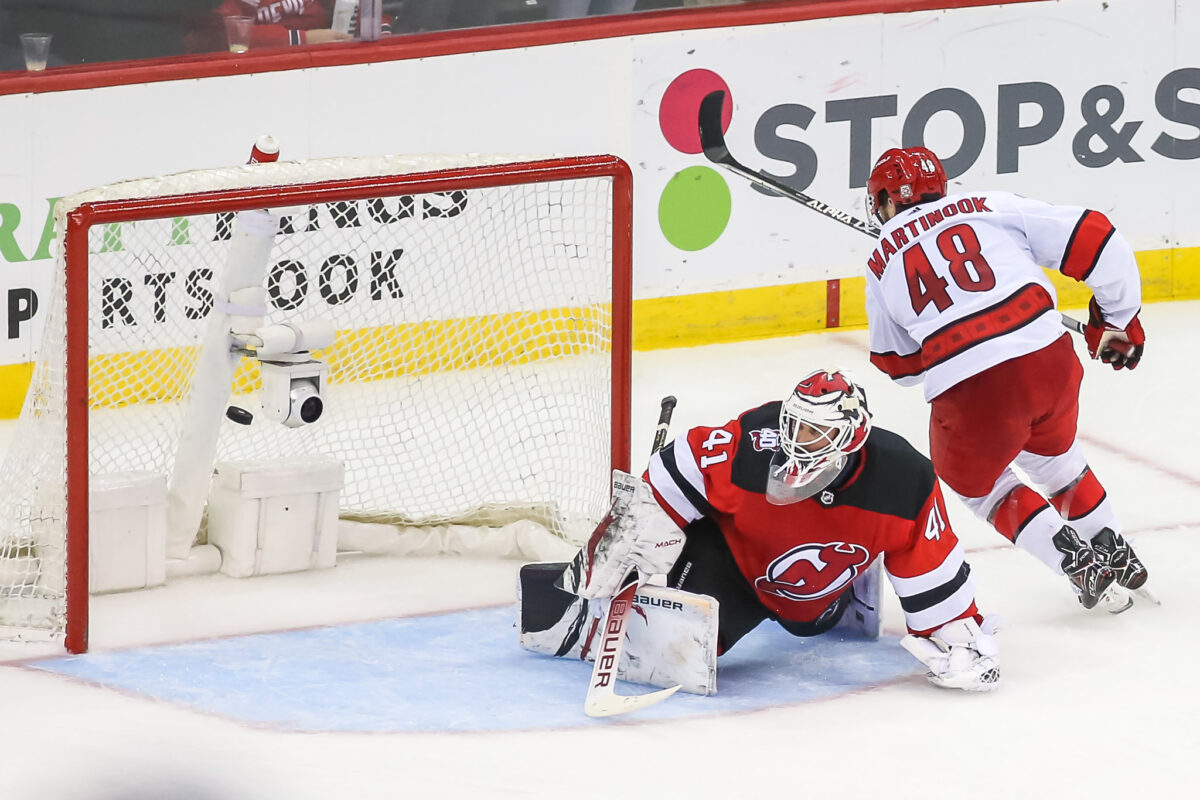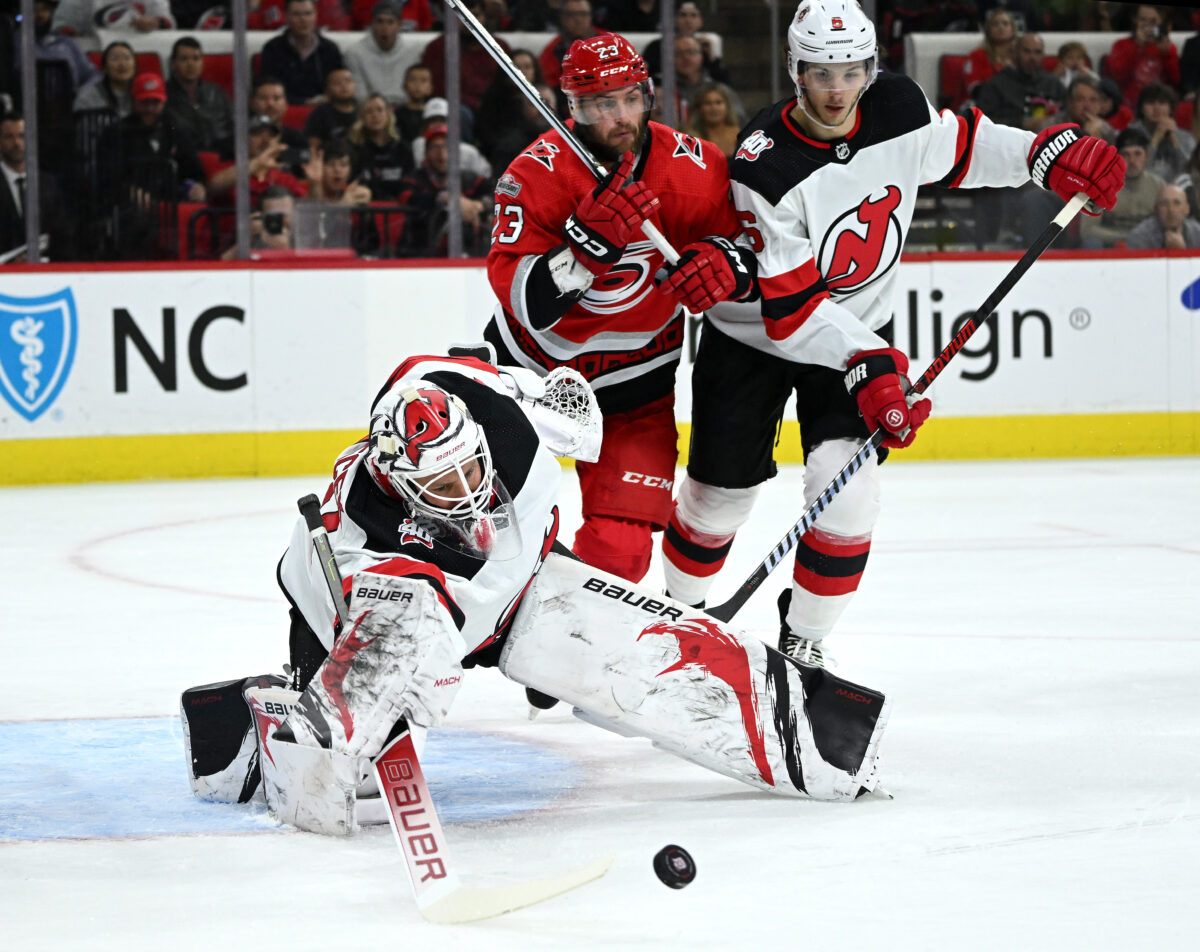On Tuesday, May 9, 2023, goaltender Vitek Vanecek led the New Jersey Devils onto the ice. The team was coming off a wild 8-4 victory over the Carolina Hurricanes in game three of the second round of the Stanley Cup Playoffs. That win brought the series to 2-1 in Carolina’s favor, with each team winning their home games. Vanecek, who was a revelation in the regular season, becoming the first Devils goaltender to win 30 games in a season since Hall of Famer Martin Brodeur’s retirement, had been abysmal in the playoffs. In the three games, he started to that point, the team was 1-2, and he had allowed 13 goals, posting a save percentage (SV%) of .841, far below the career-high .911 SV% he played in over 52 regular season games.

The Devils hoped that coming off of a game three win, Vanecek could right the ship, backstop the team to a game four win, and make it a three-game series for a birth in the Eastern Conference Finals. The team’s hopes were dashed despite Jack Hughes staking Vanecek to an early 1-0 lead. Seventeen shots on goal later, the netminder had surrendered five goals in just 15 minutes of game action across two periods. Head coach Lindy Ruff mercifully pulled Vanecek from the game halfway through the second period with the team in a 5-1 deficit that effectively ended their season. It was clear to anyone watching that the Devils had not solved the goaltender problem that had plagued them since Brodeur’s retirement. Rather than take action to address the goaltending in the offseason, the Devils instead chose to run it back with a combination of Vanecek and rookie Akira Schmid, who had outdueled reigning Vezina Trophy winner Igor Shesterkin, leading the Devils to a game-seven series victory over the rival New York Rangers.
Building Teams Over the Summer
General manager Tom Fitzgerald has often said that he prefers to build teams over the summer rather than reconstruct teams on the fly during the season. He has cited several reasons, including affording a player an entire training camp with the team and the fact that the acquisition costs are generally less expensive when not driven by the trade deadline. With Vanecek’s struggles in the playoffs and Schmid’s inexperience, there was a clear need to address goaltending over the summer. Reports surfaced indicating that the Devils preferred to start Schmid in the American Hockey League (AHL) to allow him to get a full starter’s workload rather than be part of an NHL rotation. Despite several opportunities to act, the Devils instead chose to stand pat and enter the season with Schmid and Vanecek in tandem.
Related: Lack of Urgency From Devils Front Office Dims Playoffs Hope
The choice to not address the goaltending situation was not due to a lack of opportunity. The Devils could have waded into the free agency waters, which lacked superstars but were stocked with solid upgrade options. They could have taken a chance on a goalie who had been an above-average starter to provide competition for Vanecek and Schmid, like Alex Lyon, Semyon Varlamov, Frederik Andersen, and Jonathan Quick. The Devils also possessed significant assets that could have been used in a trade for a goaltender. Reportedly, Fitzgerald focused on attempting to acquire Winnipeg Jets goalie Connor Hellebuyck, a front-runner for this season’s Vezina Trophy. Whether the Devils were unwilling to pay the high cost of acquisition and then extension or the Jets pulled him off the trading block, the result was the same, and the Devils were left without a bonafide franchise goalie heading into a season where they were a consensus top ten team in the NHL.
History Repeats Itself
George Santayana’s famous quote, “Those who cannot remember the past are condemned to repeat it,” should have been a warning to Fitzgerald about failing to solve his goalie issues. Two seasons ago, the Devils were beset by injuries to Dougie Hamilton, Nico Hischier, and Hughes and also lost both starting goaltenders to injury after losing a third (Scott Wedgewood) to a waiver claim to clear space for journeyman enforcer Mason Geertsen. The Devils would spend the entire year struggling to find consistency in goal, which would ultimately tank a season where they could display promise and could have contended for a wild card birth. During a press conference that season discussing the acquisition of Andrew “the Hamburglar” Hammond, Fitzgerald claimed he “owed” it to his team to keep trying to find the right goaltender to salvage the season. That year, the Devils ended the season in the bottom three in all major goaltending categories despite running through a franchise-high seven goalies.
Some estimated that had the Devils gotten league-average goaltending that season, it would have resulted in approximately ten more wins, putting them in the hunt for the playoffs. This theory was born the following season when the Devils received slightly above-average goaltending and vaulted to a team record in wins and points, going from out of the playoffs to having a chance to win the Metropolitan Division on the last day of the season. Certainly, the team was improved by adding Ondrej Palat, Timo Meier, and Erik Haula, but the most consequential development was the contribution of consistent goaltending.

This season, the Devils lost Hamilton to injury at the end of November, requiring surgery that would put him out for the remainder of the regular season. The depth of the loss of Hamilton was undervalued by many, but one only needs to look at the precipitous decline of the power play to see the impact. The silver lining should have been that in a cap-strapped league, the Devils now had the opportunity to place Hamilton on Long-Term Injured Reserve (LTIR), which would free up an additional nine million to use while Hamilton convalesced.
Rather than weaponize his newfound cap space, Fitzgerald chose a wait-and-see approach as his team plummeted down the standings, awaiting the healthy return of Hughes and Meier, among others. He chose not to claim or trade for any goaltenders as Schmid and Vanecek combined to put up the worst SV% in the league and take their places at the bottom of the goals saved above expected line. Fitzgerald passed on players on waivers, players who were free agents, and chose not to make any trades while the team fell farther and farther out of the playoffs. Perhaps he chalked the season up to a lost cause due to injury, but a failure to use the cap space to try to patch up the holes is an odd choice. Fitzgerald has reportedly done due diligence on several netminders but has yet to pull the trigger or even find ways to improve incrementally, if not a big, splashy move.
Both Devils’ players and now Ruff have directly and indirectly commented on the lack of saves, and its impact on the team’s success. Hughes and Hischier have both said, in their own ways, that when the team gets saves, they are difficult to beat. Similarly, after Nico Daws surrendered four goals on 14 shots in just 40 minutes of play, Ruff shared, “We need a little help on a couple of the goals. I thought our goalie struggled a little bit.” Daws has been a pro throughout this stretch, where he has been asked to play almost every game, but such a plan is not fair to him, and he has been hung out to dry often by the team. The mysterious injury to Vanecek that began as an illness and minor injury that has turned into an indefinite injury was another sign that the Devils should have been pushed to add and instead chose to maintain the status quo.
The team is currently out of the playoffs and has to find a way to make up five points in just over 20 games with multiple teams in a similar position. Trades are out there for a goaltender, and the team needs help, but now Fitzgerald has to weigh whether parting with major assets at the deadline for a team with less than a 25% chance of making the playoffs is prudent. The Devils will likely rue that they wasted a season of the Hischier, Hughes, and Jesper Bratt primes for the second time in three years because they could rely upon solid goaltending. The difference this season is that with the LTIR funds, the Devils had the resources to be bold; not doing so was equally a choice—a choice the team will have to live with moving forward.
